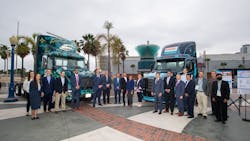New project deploys 100 electric Class 8s in California
LONG BEACH, California — Under a new joint project, 100 battery-electric regional haul and drayage trucks will be deployed to move goods across California.
The project, known as Joint Electric Truck Scaling Initiative (JETSI), is the largest commercial deployment of battery‐electric trucks in North America to date. The South Coast Air Quality Management District (South Coast AQMD) is leading the effort along with the California Air Resources Board (CARB) and the California Energy Commission (CEC).
Project partners Daimler Trucks North America (DTNA) and Volvo Trucks North America (Volvo Trucks) will produce and deliver the Class 8 battery‐electric trucks (BETs) for deployment in Schneider’s and NFI Industries’ Southern California fleet operations.
DTNA will deliver 80 battery‐electric Freightliner eCascadias, the company’s first all‐electric commercial Class 8 truck, to both Schneider (50 trucks) and NFI (30 trucks). Schneider will deploy the 50 eCascadias within its intermodal operations in Southern California. Volvo Trucks will deliver another 20 VNR Electric trucks, an all‐electric Class 8 model that the company commercialized in late 2020, to NFI. With the deployment of a combined 50 BETs at its Ontario facility, NFI will operate the first 100% zero‐emission freight logistics fleet in California.
Through the JETSI project, NFI and Schneider will collectively install 50 chargers total, warehouse upgrades, on‐site energy storage, and rooftop solar. More than 20 project partners representing charging equipment manufacturers, infrastructure providers, nonprofit organizations, technology suppliers, and more will collaborate on the eight‐year project.
“We are proud to be a part of this historic initiative here in Southern California,” said South Coast AQMD Board Member Gideon Kracov. “The agency has always been a leader in innovative collaborations that help advance zero‐emission transportation and protect the health of our communities.”
During an announcement made at ACT Expo 2021, Kracov said the project is poised to reduce five tons of pollutants such as nitrogen oxides (NOx) and particulate matter (PM) annually along Southern California’s I‐710 corridor, as well as eliminate 8,247 metric tons of greenhouse gas emissions. Connecting the San Pedro Bay Port complex to inland distribution centers and warehouses, the I‐710 sees more than twice the average Los Angeles freeway truck traffic and accounts for 20% of all PM emissions in Southern California.
"Projects like JETSI are needed to help accelerate the large‐scale manufacturing of zero‐emission trucks. They also demonstrate to other fleet operators how zero‐emission technologies are commercially competitive, especially when it comes to cost savings on fuel and maintenance," said CARB Chair Liane Randolph during ACT Expo. "Putting more of these trucks on our roads and highways as soon as we can is a primary goal of the Newsom administration, and crucial to cleaning up the air in communities adjacent to our ports and along the highways now crammed with diesel‐powered trucks.”
Operating almost exclusively in disadvantaged communities, the zero‐emission trucks are reported to replace the equivalent of more than 690,000 diesel gallons annually.
The project was funded with $26.98 million from CARB’s California Climate Investments Initiative and the CEC’s Clean Transportation Program, $5.43 million from South Coast AQMD, as well as $41.37 million in funding from project partners.
JETSI represents an industry‐wide collaboration among more than 20 public and private stakeholders. The project was assembled and will be led by South Coast Air Quality Management District along with support from the California Air Resources Board, California Energy Commission, the Mobile Source Air Pollution Reduction Review Committee (MSRC), Schneider, NFI Industries, Daimler Trucks North America, and Volvo Trucks North America. Partners including Green Paradigm Consulting, Power Electronics, Electrify Commercial, Gladstein, Neandross & Associates (GNA), Coalition for Clean Air, CALSTART, Electric Power Research Institute, Ricardo Strategic Consulting, Los Angeles Cleantech Incubator, Black & Veatch, and University of California, Riverside. The Port of Long Beach, Port of Los Angeles, and Southern California Edison will also be contributing to the project.




